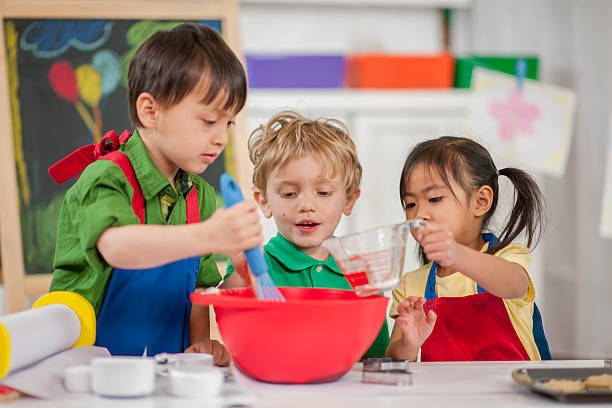Why is Involving Your Child in the Kitchen so Important?
While cooking with your child can require more time, energy, and patience, cooking is so much more rewarding when you involve your kids. Cooking and baking with your child will teach them a wide variety of different skills. From culinary skills to cognitive development to life skills, including your children in the kitchen will be a learning rich experience that could potentially spark a new hobby!
Life Skills
Cooking can teach children a variety of valuable life skills. For example, your child will learn about the importance of teamwork as you work together preparing a meal. Your child will learn the importance of following instructions as you follow each step throughout a recipe. Your child will learn the importance of patience as it takes time to prepare a meal.
As you cook with your child, they will also be able to practice good hygiene by making sure to wash their hands before touching food. You can talk to them about the importance of cleaning up after yourself as you wipe up messes and put away dishes.
Cognitive Development
Teaching your children about cooking can also help boost their cognitive development and learning. For example, language development will come naturally as you introduce your child to new vocabulary as you talk about food, nutrition, cooking utensils, etc.
Your child will also be able to develop their fine motor skills as they help you with tasks such as mixing, measuring, and using other kitchen tools.
Math and science also come into play as you’re preparing meals with your child. Your child will learn math skills such as counting, measuring, and sequencing as you’re adding ingredients. Your child will learn science skills as you talk to them about how food changes as you cook. For example, talk to them about what’s happening as you’re boiling water, cooking noodles, melting butter, etc.
Health & Nutrition
Healthy eating is so important for proper growth and development. As you cook with your child, teach them about the importance of nutrition. Involve your child in meals when using healthy ingredients such as fruits, vegetables, and whole grains. If you teach these healthy eating habits from a young age, your children will develop these healthy habits sooner and be more likely to continue them as they grow older.
Culinary Skills
Some of the more obvious skills children will learn in the kitchen are culinary skills. Your child will naturally become more familiar with cooking and baking as you work with them in the kitchen. As you ease your child into the kitchen, they will become familiar with cooking vocabulary, cooking tips, cooking utensils, and more. And who knows, maybe one day your child will be the next top chef!
10 Ways to Involve Your Children in the Kitchen
- Choosing Recipes – Let your child help you pick out recipes. Choose a couple different healthy recipes beforehand, and then ask them which one they would prefer to make. You can also encourage your child to look through cookbooks or recipe cards to find a meal on their own. If a child feels like they had a hand in the decision, they will be more likely to enjoy eating the meal.
- Grocery Shopping – Take your child grocery shopping. Allow your child to help find items you need for the recipe you picked out. As you find the food items, ask your child to cross the items off your grocery list.
- Observation – Allow your child to watch you cook and encourage them to ask questions in the kitchen. As you are preparing food, explain what you are doing and why.
- Rinsing – As you are preparing a meal, ask your child to rinse items such as fruits and vegetables in the sink. Talk to them about the importance of making sure your food is clean before you eat it. You can also turn rinsing into a sensory experience as you ask your child to describe textures, colors, and smells as they are handling the food.
- Helping Hand – Have your child hand your ingredients as you cook. Ask your child if they can name the different foods as they hand them to you. If you are asking your child to hand you more than one of the same items, have them count the number of items as they give them to you.
- Measuring– Measuring ingredients is a great way to teach children about math and numbers. Help guide them to the correct size measuring tools and let them pour the ingredients into the correct sized portions. Talk to younger children about counting and older children about fractions as you measure.
- Mixing – After all the needed ingredients are in a mixing bowl, encourage your child to help mix the ingredients together. This is a great fine motor activity for children. Talk to them about different stirring utensils such as spoons, whisks, and spatulas.
- Using Tools and Utensils– Give your child their own tools and utensils that they can use while they prepare food. If you happen to have an old or extra set, this is a great way to help children feel independent. Make sure these utensils are kid-friendly of course. Stay away from sharp objects. Try giving your child tools such as their own apron, mixing spoons, or measuring cups.
- Setting the Table – Encourage your child to help set the table before your family sits down for a meal. Teach older children the proper etiquette of table setting, explaining where each piece of silverware goes on the table.
Rising Stride Child Care Centers is a great way for parents to get their kids the care they need while also teaching them new skills, allowing them to explore, make friends and helping them develop their skills. To get your child engaged in a great environment, check out our programs and schedule a tour today.

